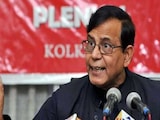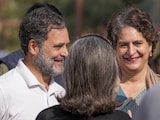Rami Zakh, a former employee at the Israeli consulate in Mumbai, was shocked when sirens blared across Jerusalem early in the morning on Saturday. Not completely unfamiliar with distress signals or emergency situations, courtesy of where he resides, but even he was a bit taken aback because terrorists rarely attack the holy city.
As Mr Zakh was beginning to comprehend what was happening, the Palestinian group Hamas, had bypassed all security barriers and launched a sensational land-air-sea assault on Israel. Nearly 5,000 rockets, militants on Israeli soil, and paragliders carrying weapons had entered the country killing off Israeli citizens at multiple locations.
"The immediate thought was that something very serious is happening because terror groups rarely target Jerusalem and its surroundings for fear of hitting Muslim holy sites," Mr Zakh told NDTV.
READ | Explained: How Mossad Functions And Why It Failed To Stop Hamas Attack
The 56-year-old, a former Israel Defense Forces (IDF) soldier, lives around 5 km from the Al-Aqsa Mosque, the third holiest site in Islam after Mecca and Medina, located on the Temple Mount, one of the holiest sites in Judaism. Mr Zakh's parents, both in their 80s, reside in Be'er Sheva, a city over a 100 km south of Jerusalem while his sister and daughter in Tel Aviv, over 60 km away in the northwest.
As the thuds of falling rockets rang in his ears, Mr Zakh, a cricket aficionado, and fan of Mumbai's fabled Iranian cafes, looked at the family WhatsApp group and saw anxious messages from his relatives.
"Looking at internet resources and TV we came to learn of the extent of what has happened. Although warning signs kept surfacing over the years, this was far more than what could have been imagined," he told NDTV. "The IDF had let us down extremely badly. Definitely a shock followed by a realisation that things are not going to be the same before and after this morning."
READ | Explained: Why Israel-Gaza War Is A Diplomatic Test For India
As Hamas militants began their assault, panic-stricken Israelis hid in their homes with reports rife that Hamas was carrying out terrorist attacks going door-to-door, shooting civilians or dragging them away.
Half a century after the outbreak of the 1973 Arab-Israeli War, Prime Minister Benjamin Netanyahu informed a shocked nation, "We are at war." The Israeli leader vowed to turn Hamas hideouts "to rubble" and urged Palestinians in Gaza to "flee".
"It was very hard to witness the helplessness of civilians, photos and videos of many elderly people and children being slaughtered in their homes or kidnapped, hundreds of young party-goers butchered at gunpoint by Islamist terrorists who take pride in their subhuman actions," Mr Zakh said.
Hamas' large-scale attack has killed at least 700 and wounded 1,200 Israelis. According to reports, at least 100 Israeli citizens have been captured by Hamas and taken to Gaza, with shocking images circulating online of bloodied hostages.
"The sights and sounds were of a scale that reminded us of what we know from the Holocaust, and never ever forget. A feeling of extreme rage ensued," Mr Zakh said.
After the shock of the onslaught subsided, Israeli forces unleashed their fury and pounded the Gaza Strip, intensifying their bombardment.
Mr Zakh, after spending around 20 years in the tech industry, is currently pursuing a PhD in computer science at Ben-Gurion University. Two days after the shock attacks, staring at empty streets and contemplating the future of his war-torn country, Mr Zakh hopes for a change in the status quo of the region.
"Now, as the war unfolds, it is clear that the status quo in which genocidal Islamist entities are allowed to thrive at our doorstep, be it in Gaza or in Lebanon, can no longer be accepted. This equation must change," he insists.
That remains the hope of not just Mr Zakh, but also thousands of Israelis who have either lost someone in the attacks or are now actively part of their country's retaliation efforts. But as things stand, both sides continue to lose blood with the war not expected to end any time soon.
NDTV is now available on WhatsApp channels. Click on the link to get all the latest updates from NDTV on your chat.















